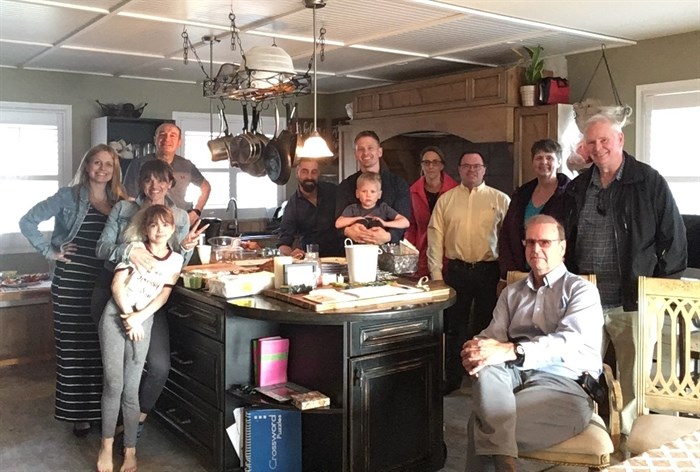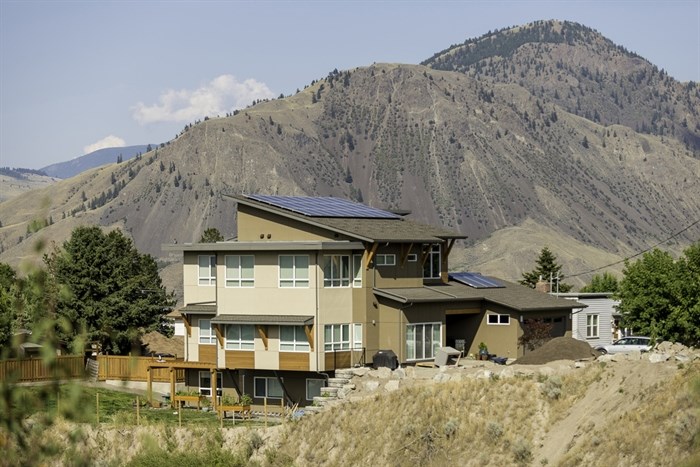
Gord Lovegrove (back left) at a cohousing meeting. Lovegrove is in the early stages of launching Kelowna's first cohousing project.
Image Credit: SUBMITTED/Gord Lovegrove
April 08, 2019 - 6:30 PM
TWO GROUPS LAUNCHING COHOUSING PROJECTS INSIST THEY CAN WORK IF DONE PROPERLY.
The idea of sharing a weekly meal with 30 of your closest neighbours may make some people shut their blinds and shudder at the very thought, but two groups in the Okanagan are determined to make it happen.
Kelowna-based UBCO associate professor Gord Lovegrove has launched Kelowna's first cohousing project, and although the project is very much in its infancy, Lovegrove is adamant the project will come into fruition.
Developed in Denmark in the 1960s, cohousing projects generally consist of individual homes, built around a common house with shared amenities. These amenities generally contain a kitchen and dining room and can have anything from kids playrooms and workshops to guest rooms and gardens.
"[Cohousing] addresses so many social problems," Lovegrove says, "lack of [housing] supply, high prices, mental illness from lack of socialization, ageing in place, single parenting, latch key kids."
Lovegrove teaches at UBCO's School of Engineering and has been researching community planning and design throughout his career. He equates cohousing as a throwback to the early homesteaders and the close-knit communities they lived in.
"But we lost that," he says. "Suburbia happened."
Lovegrove imagines the project to consist of around 30 units, each 1,100 square feet and fully self-contained, centred around a communal clubhouse on a one- or two-acre site. Along with the communal clubhouse where residents would cook a weekly meal together, there would be access to shared vehicles, a garden and workshop. Each unit would cost around $400,000 - cheaper than the average Kelowna condo, Lovegrove says.
"The bottom line is your quality of life goes way up, your cost of living goes way down," he says.
A recent academic paper published in the Canadian Journal of Public Health points out the many physical and mental benefits of cohousing and advises public health facilitators to promote such housing models. B.C. is home to roughly 20 cohousing projects but launching such projects can be difficult.
Achieving a consensus within a group and then financing a project is no easy feat and projects often fall in these early stages says Alan Carpenter, who founded the Canadian Cohousing Network in 1994.
"Groups trying to create a consensus around that group will never get there," Carpenter says.
The type of people often attracted to cohousing are also go-getters who believe they do can it themselves so it's a "mistake" Carpenter says he often sees. Getting financing also has its issues, with large amounts of capital often needed, shutting out first-time buyers. Once a site is bought, things normally go more smoothly but problems still arise.
"Once you put in money, people want more control, especially with those who haven't put money in," he says.
These are all issues Lovegrove is aware of and aims to mitigate. With eight families in the early discussion stage, Lovegrove wants each group to put up $250 to hire a facilitator. Then in six months $5,000, following that $50,000 to buy the land.
"Disputes arise... if you don't have a very strong facilitation process that includes writing out in black and white an agreed 100 per cent consensus on a dispute resolution process," Lovegrove says. "So go in with your eyes open."
Lumby resident Chris Bauman is also in the very early stages of developing a cohousing project. Influenced by her childhood growing up in small-town Ontario in the 1960s where there were "100 kids" playing on her street, Bauman says reaching consensus can be arduous, and inequity could cause problems, but with the correct structures in place, conflict can be avoided.
"It's the cultivation of community... people with like-minded values and are willing to put their money where their mouth is," Bauman says. "My husband and I are in our 60s and 70s we don't have any more time, we have to do this now."
Kamloops resident Mary Jordan is one success story who along with eight other people make up RareBirds Housing Co-operative. From their first meeting in 2011 to moving into the purpose-built house in 2014, RareBirds differentiates itself from a cohousing project as all nine residents share a kitchen.
Jordan doesn't use the word commune - she says it has negative connotations - and instead says they are "an intentional community." Jordan said each member committed $225,000 for a share in the co-op and have protocols to deal with situations if and when they arise.
"One of the top reasons co-ops fail is that people don't pay enough attention to... the business of living together, they operate it more like a business venture," Jordan says, "but they don't pay attention to relationships."
Jordan jokes that although she's in her 70s "living this way challenges you to 'grow-up.'"
Both Lovegrove and Bauman are adamant they're not just talk and will make their projects happen. Lovegrove says he's been talking about it since 2005 and will now make it a reality.
"We're all in, we're going to make it happen," Bauman says.

The RareBirds housing cooperative is perched at the end of Battle Street West and his covered in solar panels.
Image Credit: SUBMITTED/ Dennis Owen and Tyler Meade
To contact a reporter for this story, email Ben Bulmer or call (250) 309-5230 or email the editor. You can also submit photos, videos or news tips to the newsroom and be entered to win a monthly prize draw.
We welcome your comments and opinions on our stories but play nice. We won't censor or delete comments unless they contain off-topic statements or links, unnecessary vulgarity, false facts, spam or obviously fake profiles. If you have any concerns about what you see in comments, email the editor in the link above.
News from © iNFOnews, 2019